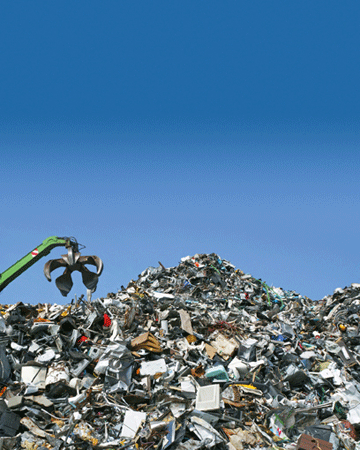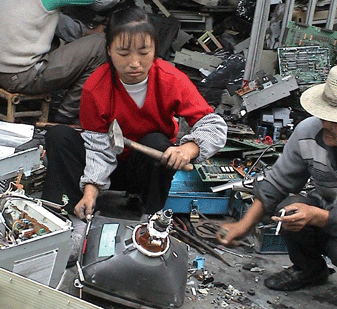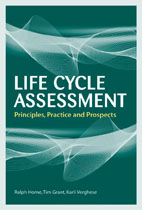Published: 2009
Negotiating the national e-waste mountain
Mary-Lou Considine
A voracious national appetite for electronic goods is creating a waste problem we can no longer responsibly ignore.

|
|
When discarded computers, TVs and other e-waste find their way to landfill, they leach toxic chemicals such as lead, mercury and flame retardants into soil and groundwater. Credit: iStockphoto/Lya Cattel
|
Australians are generating electronic waste – discarded computers, TVs, mobile phones, DVDs, printers, keyboards, cameras, iPods and game consoles – at an unprecedented rate. In 2006, we threw out around 1.6 million computers1 alone, and the volume has risen since. Over the past decade, we’ve committed an estimated 37 million computers and 17 million TV sets to landfill, as a result of our constant demand for new electronic products.2
Yet, while Australia is among the top 10 consumers of electronic technology in the world, we are behind many OECD countries in our recycling rates: 1.5 per cent for computers, less than 1 per cent for TVs and less than 4 per cent for mobile phones.
One reason is that e-waste is a complex waste stream for councils, recyclers and regulatory authorities to deal with, because it not only contains mixed materials such as plastics, metals and glass, but also toxic substances like mercury, lead, arsenic and flame retardants.
This mix of commodity and toxic materials means the cost of processing and recycling e-waste is higher than that of other waste streams, relative to the value of recovered materials.
The question is: if landfill is not an option for e-waste, who will bear the cost of recycling? Would it be manufacturers and importers, or councils who would ultimately bill ratepayers or consumers through increased rates?
Interestingly, many of Australia’s major brand-name computer and TV manufacturers say they are ready and willing to factor the cost of recycling their e-waste into product prices, if national regulation is introduced that would make it compulsory for all manufacturers to take responsibility for the goods they produce.
In late May, at the time of writing, these manufacturers – along with environment groups and councils – were keenly awaiting an announcement from an Environmental Protection and Heritage Council meeting of state and federal environment ministers about whether or not the government would go ahead with national regulation to mandate producer responsibility for the collection and recycling of e-waste.
E-waste is one of the few issues where environmental groups and industry are supporting each other in a joint effort to lobby for national product stewardship regulation.
A few weeks prior to the May meeting, the Total Environment Centre (TEC) and the Australian Information Industry Association (AIIA) signed an ‘End-of-life Computer Equipment Compact’, also supported by Environment Victoria, Clean Up Australia and Choice.
The TEC said the compact sets out the principles required for an effective regulatory regime that would cover the entire industry and provide a ‘safety net’ so that those who complied were not ‘outpriced’ by non-compliant manufacturers, ensuring a level playing field in terms of competitive product pricing.
Jane Castle, the TEC’s e-waste campaign manager, believes a regulated national computer and television recycling scheme could lead to much higher recycling rates – perhaps as high as 75 per cent for computers.
According to Castle, the ‘patchy’ nature of current e-waste schemes around Australia has helped contribute to the country’s low recycling rates.
‘Some councils have set up e-waste collection days, but ratepayers have borne the cost. Other councils are not acting, but waiting for a push from state and federal environment agencies.’
Among the local e-waste schemes already in place around the country, one of the most well-known is Byteback, a collaboration between AIIA, numerous major brand owners, local government, Officeworks and Sustainability Victoria.
The voluntary computer-product takeback program – involving 11 of Australia’s top-name computer companies – targets computer waste from Victorian households and small businesses.
Computer waste from collection points at eight locations throughout Victoria – six municipal drop-off points and two Officeworks stores – is sent to participating recyclers, SIMS, TIC and MRI. These companies disassemble and process the items for materials recycling in Australia or export the toxic components, under licence, to certified processing facilities overseas.
Jan van de Graaff from Sustainability Victoria points out that Byteback – now in its fourth year of operation – is really a pilot scheme established to identify how a broader voluntary e-waste program might operate.
‘One of the aims has been to gather data to show what percentage of waste products can be assigned to each different brand,’ he says.
‘It is conceivable that once companies take responsibility for their waste, they will design products to last longer, to be more easily disassembled and to include less toxic materials.’
The Byteback experience has proven the need for participation of all manufacturers and importers in a national scheme. ‘Only 45 per cent of the products recycled belong to the 11 participating brands,’ said van de Graaff.
‘The other 55 per cent belongs to non-participating big-name brands and smaller “white box” importers. Sustainability Victoria has covered the cost of recycling the waste from these non-participant manufacturers.’
How does Australia compare with other countries when it comes to e-waste? Product Stewardship Australia’s John Gertsakis says our international performance is under par. The European Union has a Waste Electrical and Electronic Equipment (WEEE) directive that provides for free e-waste collection schemes for consumers in member countries. Fourteen US states have e-waste recycling legislation in place, as do Canada, South Korea, Japan, New Zealand, Taiwan and some South American countries.
Gertsakis says Product Stewardship Australia (PSA) has developed a comprehensive product stewardship plan for managing a national TV recycling service for consumers that covers product recovery and disassembly, community education, program financing, and robust collection and recycling targets.
PSA’s 12 members supply 80 per cent of televisions sold in Australia. According to Gertsakis, they were keenly anticipating a ‘clear announcement’ from the federal environment minister in late May about a timeline for the introduction of a national regulatory scheme.
‘If we get that, PSA and its member companies could be in a position within six months to be able to operate a scheme,’ he said.
Given the tiny fraction of e-waste that is collected for recycling, the e-waste recycling industry has faced a real challenge in maximising returns from its infrastructure investments.
SIMS Recycling Solutions has five operations in Australia, including a recently built facility in Sydney with specialised equipment for separating and shredding tens of thousands of tonnes of e-waste annually.

|
|
A woman in China about to smash a computer monitor to pull out copper. Manual disassembly of cathode ray tubes exposes inadequately protected workers to lead in the CRT glass and highly toxic phosphor dust. Credit: Basel Action Network
|
According to SIMS’ Kumar Radhakrishnan, this facility, in tandem with metal, glass and plastics recycling operations of SIMS elsewhere in Australia and the world, produces high-quality commodity materials that ultimately help reduce the emissions and environmental damage caused by mining and manufacture of virgin materials.
‘Proper recycling costs money,’ he says, adding that some recyclers ‘just take the good bits’ and export the remaining waste, which can contain hazardous materials.
Another recycling company, MRI, also rehabilitates used products for a second or third life. MRI’s Will Le Messurier says most of the reused product is collected from corporate and government sectors, with the tested and registered second-hand product being sold to domestic and small business markets, including education.
CRT Recycling in Adelaide specialises in handling cathode ray tube (CRT) waste – the glass-screen units in older TVs and computer monitors that can contain up to 4 kg of lead per unit, largely encapsulated in the back-end ‘funnel’ glass.
Managing Director Michelle Morton says CRT’s automated recycling system is the only one in Australia specialising in recycling CRT glass. It uses purpose-designed processes and machinery that cleans, separates and removes contamination from the CRT glass to prepare it for recycling to manufacturers of new CRTs.
TES-AMM, another Australian recycler, recently issued a call for more public awareness of the practice of developed countries dumping e-waste into developing countries where it is manually broken down to recover minute amounts of precious metals and other by-products, exposing low-paid labourers in these countries to dangerous toxins.
However, Michelle Morton feels that without uniform national legislation to promote diversion of e-waste from landfill, Australia is effectively exposing its own citizens to the same hazardous substances, which can find their way from landfill to people via contaminated groundwater or land redevelopment.
‘When you consider that making one desktop computer and monitor uses the same amount of chemicals (22 kg), water (1500 kg) and fossil fuels (240 kg) as a midsize car,’ she points out, ‘it makes no sense to bury them when we have finished with them.’
More information:
1 Australian Bureau of Statistics (2006) Australia’s Environment Issues and Trends. Cat. no. 4613.0.
2 ‘Tipping point: Australia’s e-waste crisis’, Total Environment Centre report, December 2008.






